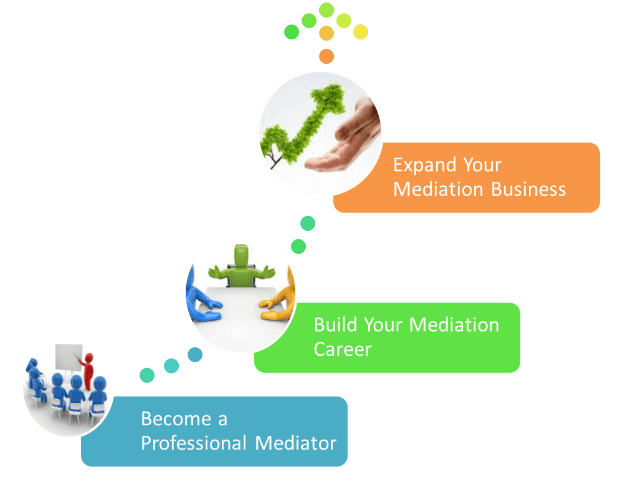3 Steps to start a successful mediation practice business

Mediators from all over around are asking the same question: how do I start, sustain, and grow a mediation practice?
How do I get mediation clients?
If this is an issue you’re currently facing, then we have expert tips that can help you.
Here are the 3 steps for How to start a mediation practice:
- Step 1: Become a professional mediator
- Step 2: Build your mediation practice
- Step 3: Expand your mediation business
Let's dive in and detail each step.
Benjamin Franklin: "Failing to plan is planning to fail"
To create a successful mediation business, you need to plan ahead. Success comes from being highly visible to people who would benefit from using or referring your services, and generating high visibility requires a plan. Not just a simple idea of the steps you need to take, but a comprehensive marketing strategy with a defined target audience.
President of the American Institute of Mediation, Lee Jay Berman, believes that the most common mistake that mediators make is failing to “treat a mediation practice like a business, complete with a business plan, budgeting, marketing plan and even board of directors.”
You might be a fantastic mediator, able to solve issues with the swiftness of a Jedi Knight, but the act of running a mediation business requires different skills than the act of mediating a conflict – How to start a mediation business?
Use this roadmap to learn the necessary steps to take you down the path toward a successful mediation business – and acquire tools to help with the challenges you will surely face along the way.
Here are the 3 essential steps to start and grow your mediation practice:

- Take or update your mediation training. What training do you need? What practice area will you select?
- Build your mediation practice. What do you need to be a successful professional mediator? How do you get your business going?
- Expand your mediation business. How do you nourish your business to keep it alive and thriving?
It should be noted that these steps are not necessarily sequential. For example, many experienced mediators take ongoing training to stay abreast of the industry and acquire specialized skills.
Step 1: Become a professional mediator
If you’ve been researching how to become a mediator, you probably already know that you will need education and training. Most states require a minimum of 30-40 hours of training to be considered as qualified for listing as a court-approved mediator.Check out these sources for more information “Mediation Degrees and Certificates” and “Basic and Advanced Mediation Training Providers”.
In reality, however, many clients will expect you to have far more hours of training before trusting you with their business. Go beyond the basics! Take a variety of courses with a variety of instructors, teaching a variety of styles – then ask yourself detailed questions about your experiences. Did they advocate for facilitative or another style of mediation? What type of mediation seems most effective? What role is best for you? What format do you like the most?
This will help you determine the style that works best for you.
Find an experienced mediator who is willing to mentor you and spend time observing his/her practice.
Continue to learn from other mediators by reading their blogs and watching their videos. Bruce Friedman, Dan Simon, Jan Frankel Schau, Gordon White, Donald Swanson, Mark B. Baer, and Forrest Mosten are great resources to start with.
Check-out our onenote notebook with over 560 links to great content about mediation practice and mediation training.
Learn about mediation in volunteer programs. Check this list Community Mediation Programs and Training provided by the Southern California Mediation Association (SCMA).
Even if you’re already a well-respected mediator, continue to look for opportunities to sharpen your skills. Continually refining your skills and knowledge will be the success of your business.
Learning should never stop.
If you haven’t already done so, determining an area of specialty can also help facilitate business growth.
Why?
On the surface, it might seem like doing a little bit of everything is the way to get customers. After all, the more you do, the more chances you have to find someone to work with, right?
Unfortunately, it doesn’t work this way. The best way to stand out from your competition is to serve a specific niche.
CC Marketing Online advises that a niche has two benefits: “First, you can provide more value to your clients because you have honed your expertise in an area relevant to them, and second, you limit the competition you face.”
Think about your experience, expertise, and areas of interest. What types of disputes would you be best at resolving? What style of mediation do you prefer? What groups of people do you want to work with? Do you have past experience to draw upon?

Your answers to those questions will help you find a specialization. For example, if you enjoy facilitative mediation (focusing on preserving the relationship between the parties) and have social work experience, then working on achieving the skills and certifications you need to focus on family-oriented mediation cases might be the right decision for you.
There are many areas of practice to choose from; shop around until you find a specialization that really works for you. Don’t get discouraged!
Step 2: Build your mediation practice
Create a mediation business plan to ensure you have a proper understanding of what running your own business will entail. It should include a proposed budget, an environmental analysis, a competitor analysis, a mission statement, some ideas about marketing, and a general timeline to launch.
Determine a name for your business and where you will locate your office. Make a list of supplies you will need for day-to-day operations: file folders, copy machine, stapler, etc.
Take the time to cultivate your reputation as a capable and trustworthy mediator. Your reputation is by far your most important asset when acquiring clients and referrals – and, therefore, a sustainable business.
As Reputation Defender notes, “When you’re just starting out, it can be difficult to see how you build a good business reputation. But the truth is that it’s much like building your own business; you get out of it what you put into it—no more, no less.”
Of course, one of the most important tools for establishing credibility as a business owner today is having a website. As a mediator, your website should include your professional background; description of your practice and approach, credentials, and services; and testimonials of your results.
If you can’t design a modern, clean-looking, and intuitive website on your own, hire a professional web designer to do it with you.
Next, put yourself in a position to meet potential clients and referral sources. Put your efforts into where they already are; do not expect them to come to you.
To do this in person:
Attend bar association meetings, lunches, seminars, and other events
Attend trade association gatherings
Attend local Chamber of Commerce events
Host a business open house or grand opening
Book speaking engagements for yourself
Join and get active in a local mediation association
To do this online:
Optimize your website with useful, shareable content
Create useful, shareable content for others (newsletter articles, guest blogs, etc.)
Create winning digital profiles on relevant platforms such as MediatorSelect.com
Get active on relevant social media platforms
Host webinars
As you meet potential clients and referral sources, whether in person or online, create a marketing directory of their names, phone numbers, and email addresses. This will form the basis of your marketing email list, to be used for monthly newsletters or other (sparingly timed) email marketing activities.
In your directory, include a personal note describing the topic of your conversations, what kind of services they are interested in, any preferences expressed, and any other pertinent details about them. When you meet them next, you’ll be able to pick up your conversation where you left off and they’ll be impressed that they don’t have to repeat anything.
Treating your clients with this level of care is a small effort on your part, with a big payoff to your business.
After a successful mediation, ask clients to provide a testimonial for your website. Testimonials are “social proof” to other people looking for mediation services that you’re capable of delivering results.
Stay in periodic contact with clients by sending email newsletters or occasional snail mail, such as holiday cards. Just a “touch” or two each year will keep you fresh in their minds.
The best way to get your (now former) clients to become a referral source is to:
Provide stellar service.
Ask for their referrals.
Talking about marketing can be less mastered in some mediation circles, but without marketing, you can’t sustain or grow your mediation practice. It doesn’t have to be sinister. At its core, marketing is “an ongoing communications exchange with customers in a way that educates, informs and builds a relationship over time,” says marketing expert Heidi Cohen.
The foundation of a good marketing strategy is a deep understanding of the needs of your target markets – your hiring parties and referral sources. Invest time investigating their common demographics, desires, needs and concerns? What are their possible objections to using mediation and how can you overcome them?
When you have identified and described your target markets, create buyer personas for them. Use the buyer personas to determine whether your specialization, cost, in-person and online promotional activities, align with the needs and capabilities of your buyer personas. If they do, you’re on track! If they don’t, adjustments are needed.
Step 3: Expand your mediation business
Keep your business alive by strategizing ways to expand and thrive.

Get involved. Join a professional association and get involved.
Discuss: join the conversation, especially if it’s about your area of practice.
Publish: articles in the association's newsletter.
Serve: associations always have committee, board, and liaison positions.
Coordinate: training courses for new mediators, community informational presentations sponsored by the association.
Publish. Establish yourself as a knowledgeable leader in the mediation community by writing and publishing long-form content. More than a blog post, these are white papers and case studies that could be published on your website or submitted to industry publications.
Diversify. Expand the services you offer. Offer training or mentoring. Volunteer. Form a partnership with another mediator who compliments your skills and abilities.
Reduce your risk. Once your business is established, you actually have more to lose than when the business was new. Mediator liability insurance should be a consideration at this stage.
Be seen. Step up your public speaking engagements; perhaps you’re ready for a presentation at a national conference, or to direct a community mediation non-profit?
Revise your marketing plan. While you should review and revise your marketing plan every year, after a few years, it’s time to tighten your marketing focus. Get rid of your worst-performing marketing channel and redirect that energy into identifying new target markets or focusing more on referral sources.
With this roadmap and the innumerable detailed sources available online, MediatorSelect is ready to support your journey to success!

Do you feel more comfortable about becoming a full-time mediator and marketing your service? Did you know some of these tactics and terms already? What are the next steps for your business?
Let’s chat in the comments!
If you've enjoyed this article, please be sure to forward it to a friend!


